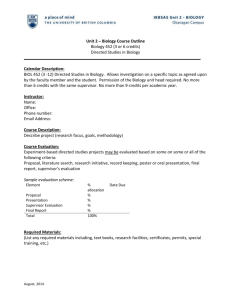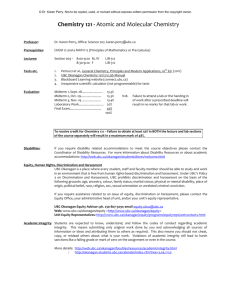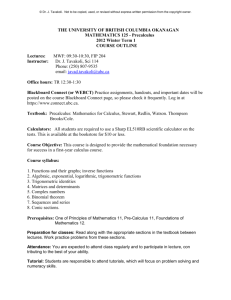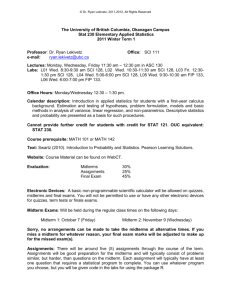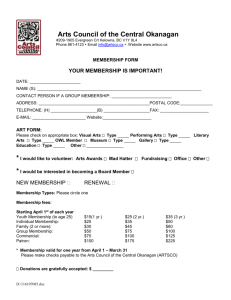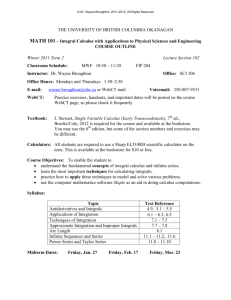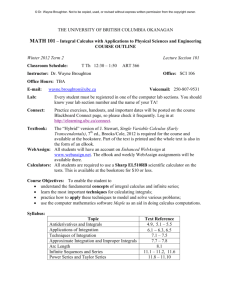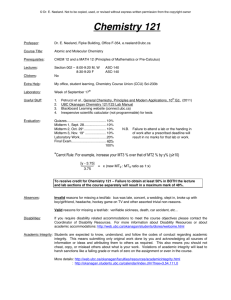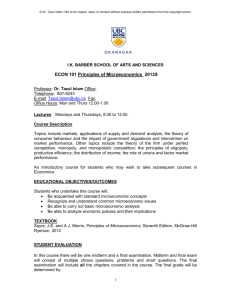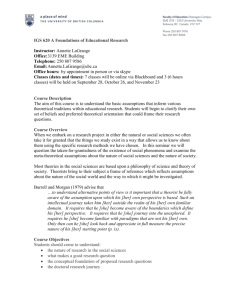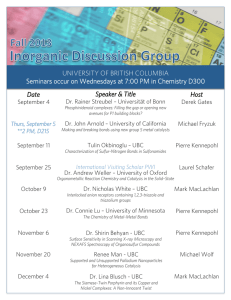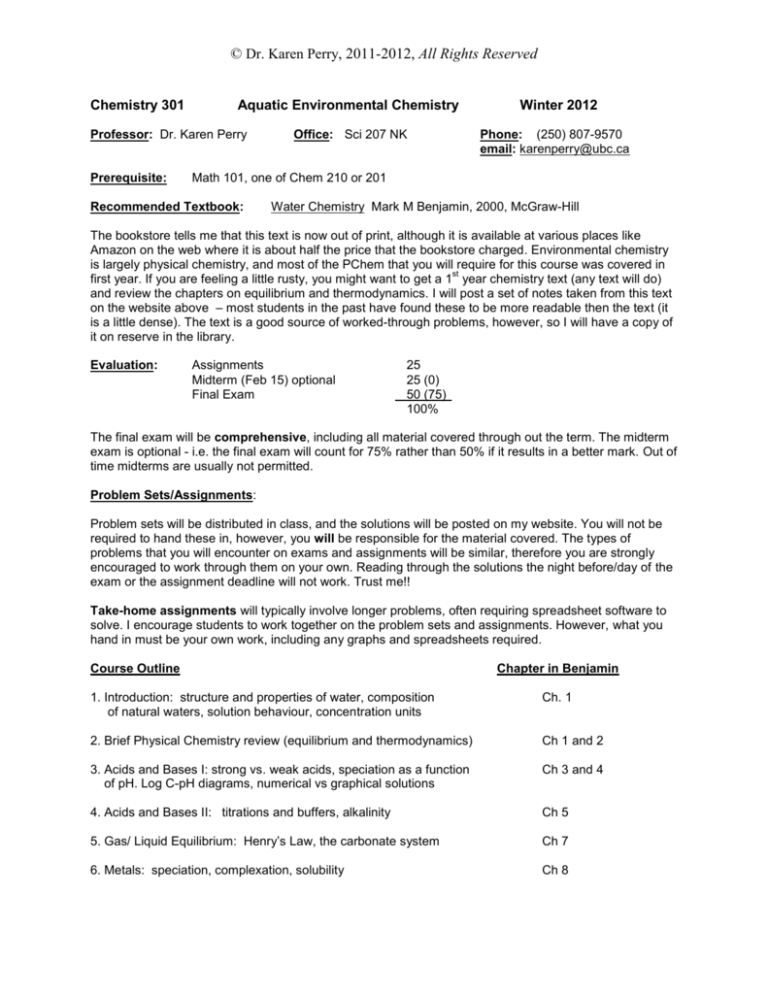
© Dr. Karen Perry, 2011-2012, All Rights Reserved
Chemistry 301
Aquatic Environmental Chemistry
Professor: Dr. Karen Perry
Prerequisite:
Office: Sci 207 NK
Winter 2012
Phone: (250) 807-9570
email: karenperry@ubc.ca
Math 101, one of Chem 210 or 201
Recommended Textbook:
Water Chemistry Mark M Benjamin, 2000, McGraw-Hill
The bookstore tells me that this text is now out of print, although it is available at various places like
Amazon on the web where it is about half the price that the bookstore charged. Environmental chemistry
is largely physical chemistry, and most of the PChem that you will require for this course was covered in
st
first year. If you are feeling a little rusty, you might want to get a 1 year chemistry text (any text will do)
and review the chapters on equilibrium and thermodynamics. I will post a set of notes taken from this text
on the website above – most students in the past have found these to be more readable then the text (it
is a little dense). The text is a good source of worked-through problems, however, so I will have a copy of
it on reserve in the library.
Evaluation:
Assignments
Midterm (Feb 15) optional
Final Exam
25
25 (0)
50 (75)
100%
The final exam will be comprehensive, including all material covered through out the term. The midterm
exam is optional - i.e. the final exam will count for 75% rather than 50% if it results in a better mark. Out of
time midterms are usually not permitted.
Problem Sets/Assignments:
Problem sets will be distributed in class, and the solutions will be posted on my website. You will not be
required to hand these in, however, you will be responsible for the material covered. The types of
problems that you will encounter on exams and assignments will be similar, therefore you are strongly
encouraged to work through them on your own. Reading through the solutions the night before/day of the
exam or the assignment deadline will not work. Trust me!!
Take-home assignments will typically involve longer problems, often requiring spreadsheet software to
solve. I encourage students to work together on the problem sets and assignments. However, what you
hand in must be your own work, including any graphs and spreadsheets required.
Course Outline
Chapter in Benjamin
1. Introduction: structure and properties of water, composition
of natural waters, solution behaviour, concentration units
Ch. 1
2. Brief Physical Chemistry review (equilibrium and thermodynamics)
Ch 1 and 2
3. Acids and Bases I: strong vs. weak acids, speciation as a function
of pH. Log C-pH diagrams, numerical vs graphical solutions
Ch 3 and 4
4. Acids and Bases II: titrations and buffers, alkalinity
Ch 5
5. Gas/ Liquid Equilibrium: Henry’s Law, the carbonate system
Ch 7
6. Metals: speciation, complexation, solubility
Ch 8
© Dr. Karen Perry, 2011-2012, All Rights Reserved
7. Redox equilibria: pe, speciation
Ch 9
© Dr. Karen Perry, 2011-2012, All Rights Reserved
ACADEMIC INTEGRITY
The academic enterprise is founded on honesty, civility, and integrity. As members of this enterprise, all
students are expected to know, understand, and follow the codes of conduct regarding academic
integrity. At the most basic level, this means submitting only original work done by you and
acknowledging all sources of information or ideas and attributing them to others as required. This also
means you should not cheat, copy, or mislead others about what is your work. Violations of academic
integrity (i.e., misconduct) lead to the breakdown of the academic enterprise, and therefore serious
consequences arise and harsh sanctions are imposed. For example, incidences of plagiarism or cheating
may result in a mark of zero on the assignment or exam and more serious consequences may apply if
the matter is referred to the President’s Advisory Committee on Student Discipline. Careful records are
kept in order to monitor and prevent recurrences.
A more detailed description of academic integrity, including the policies and procedures, may be found
at http://www.calendar.ubc.ca/okanagan/index.cfm?tree=3,54,111,959.
If you have any questions about how academic integrity applies to this course, please consult with your
professor.
DISABILITY SERVICES
If you require disability-related accommodations to meet the course objectives, please contact the
Coordinator of Disability Resources located in the Student Development and Advising area of the
student services building. For more information about Disability Resources or academic
accommodations, please visit the website at:
http://web.ubc.ca/okanagan/students/disres/welcome.html
Examination hardships & Grading Practices
th
st
The final exam period for the first term is Dec. 7 to 21 inclusive. The date of the final exam is set by the
registrar. Generally, no out-of-time exams are permitted, other than due to serious illness. This is a
Senate policy on examinations and can be found in the online calendar along with other Senate
examination regulations. http://okanagan.students.ubc.ca/calendar/index.cfm?tree=3,41,89,0
If you are not already familiar with UBCO grading practices a brief description can be found at:
http://okanagan.students.ubc.ca/calendar/index.cfm?tree=3,41,90,1014
Equity, Human Rights, Discrimination and Harassment
UBC Okanagan is a place where every student, staff and faculty member should be able to study and
work in an environment that is free from human rights based discrimination and harassment. If you
require assistance related to an issue of equity, discrimination or harassment, please contact the Equity
Office, your administrative head of unit, and/or your unit’s equity representative.
UBC Okanagan Equity Advisor: ph. 250-807-9291; email equity.ubco@ubc.ca
Web: www.ubc.ca/okanagan/equity <http://www.ubc.ca/okanagan/equity>
Unit Equity Representatives:
http://www.ubc.ca/okanagan/equity/programs/equityreps/unitcontacts.html

